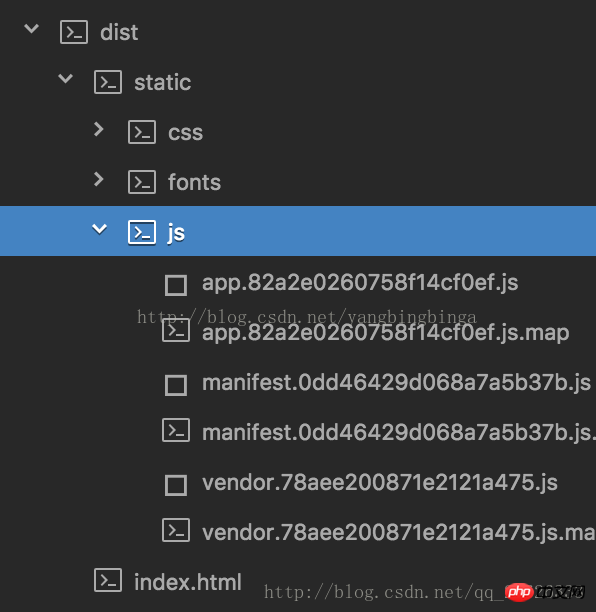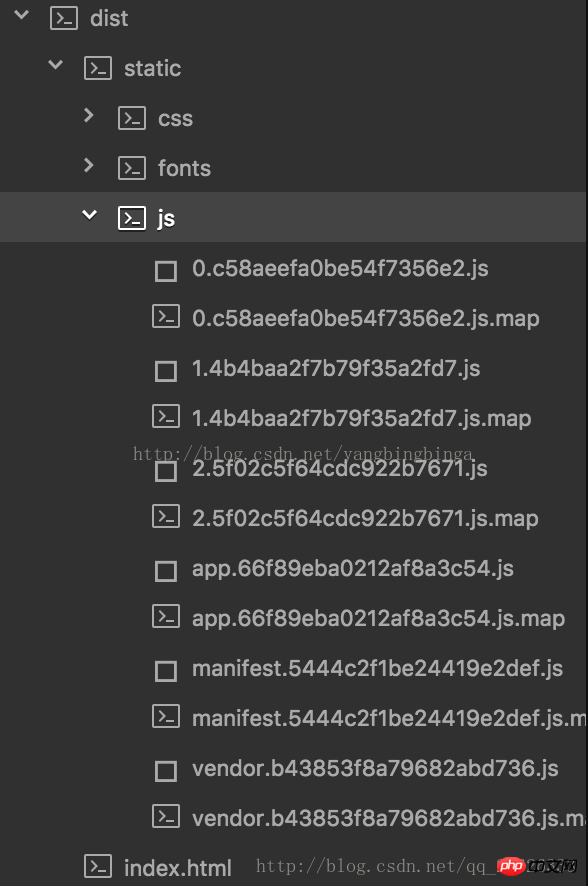Home >Web Front-end >JS Tutorial >How to load component webpack require.ensure in vue
本篇文章主要介绍了vue按需加载组件webpack require.ensure的方法,具有一定的参考价值,感兴趣的小伙伴们可以参考一下
vue-cli是由vue官方发布的快速构建vue单页面的脚手架。
使用 vue-cli构建的项目,在 默认情况下 ,执行 npm run build 会将所有的js代码打包为一个整体,
打包位置是 dist/static/js/app.[contenthash].js
类似下面的路由代码
router/index.js 路由相关信息,该路由文件引入了多个 .vue组件
import Hello from '@/components/Hello' import Province from '@/components/Province' import Segment from '@/components/Segment' import User from '@/components/User' import Loading from '@/components/Loading'
执行 npm run build 会打包为一个整体 app.[contenthash].js ,这个文件是非常大,可能几兆或者几十兆,加载会很慢

所以我们需要分模块打包,把我们想要组合在一起的组件打包到一个 chunk块中去,分模块打包需要下面这样使用 webpack的 require.ensure,并且在最后加入一个 chunk名,相同 chunk名字的模块将会打包到一起。
webpack中利用require.ensure()实现按需加载
1、require.ensure()
webpack 在编译时,会静态地解析代码中的 require.ensure(),同时将模块添加到一个分开的 chunk 当中。这个新的 chunk 会被 webpack 通过 jsonp 来按需加载。
语法如下:
require.ensure(dependencies: String[], callback: function(require), chunkName: String)
依赖 dependencies
这是一个字符串数组,通过这个参数,在所有的回调函数的代码被执行前,我们可以将所有需要用到的模块进行声明。
回调 callback
当所有的依赖都加载完成后,webpack会执行这个回调函数。require 对象的一个实现会作为一个参数传递给这个回调函数。因此,我们可以进一步 require() 依赖和其它模块提供下一步的执行。
chunk名称 chunkName
chunkName 是提供给这个特定的 require.ensure() 的 chunk 的名称。通过提供 require.ensure() 不同执行点相同的名称,我们可以保证所有的依赖都会一起放进相同的 文件束(bundle)。
让我们来看以下的项目
\\ file structure | js --| | |-- entry.js | |-- a.js | |-- b.js webpack.config.js | dist
\\ entry.js
require('a');
require.ensure([], function(require){
require('b');
});\\ a.js console.log('***** I AM a *****');
\\ b.js console.log('***** I AM b *****');
\\ webpack.config.js
var path = require('path');
module.exports = function(env) {
return {
entry: './js/entry.js',
output: {
filename: 'bundle.js',
path: path.resolve(__dirname, 'dist')
}
}
}通过执行这个项目的 webpack 构建,我们发现 webpack 创建了2个新的文件束, bundle.js 和 0.bundle.js。
entry.js 和 a.js 被打包进 bundle.js.
b.js 被打包进 0.bundle.js.
2、require.ensure() 的坑点
(1)、空数组作为参数
require.ensure([], function(require){
require('./a.js');
});以上代码保证了拆分点被创建,而且 a.js 被 webpack 分开打包。
(2)、依赖作为参数
require.ensure(['./a.js'], function(require) {
require('./b.js');
});上面代码, a.js 和 b.js 都被打包到一起,而且从主文件束中拆分出来。但只有 b.js 的内容被执行。a.js 的内容仅仅是可被使用,但并没有被输出。
想去执行 a.js,我们需要异步地引用它,如 require(‘./a.js'),让它的 JavaScritp 被执行。
(3)、单独打包成自己写的名字配置
需要配置chunkFilename,和publicPath。publicPath是按需加载单独打包出来的chunk是以publicPath会基准来存放的,chunkFilename:[name].js这样才会最终生成正确的路径和名字
module.exports={
entry:'./js/entry.js',
output:{
path:path.resolve(__dirname,"./dist"),
filename:'js/a.bundle.js',
publicPath:"./",
chunkFilename:'js/[name].js'
}所以router/index.js 修改为懒加载组件:
const Province = r => require.ensure([], () => r(require('@/components/Province.vue')), 'chunkname1') const Segment = r => require.ensure([], () => r(require('@/components/Segment.vue')), 'chunkname2') const Loading = r => require.ensure([], () => r(require('@/components/Loading.vue')), 'chunkname3') const User = r => require.ensure([], () => r(require('@/components/User.vue')), 'chunkname3')
根据 chunkame的不同, 上面的四个组件, 将会被分成3个块打包,最终打包之后与组件相关的js文件会分为3个 (除了app.js,manifest.js, vendor.js)
分模块打包之后在 dist目录下是这样的, 这样就把一个大的 js文件分为一个个小的js文件了,按需去下载,其他的使用方法和import的效果一样

上面是我整理给大家的,希望今后会对大家有帮助。
相关文章:
The above is the detailed content of How to load component webpack require.ensure in vue. For more information, please follow other related articles on the PHP Chinese website!